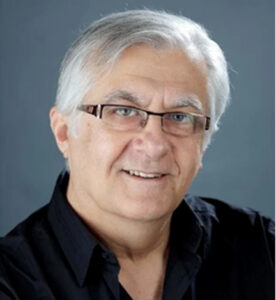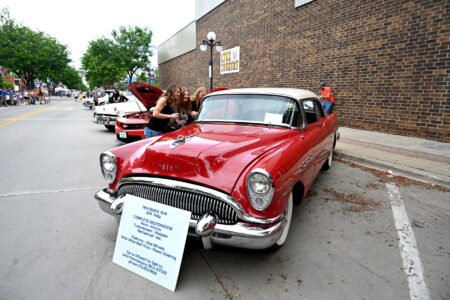Democracy in action
Sen. Charles Grassley visits Webster City High School

—Daily Freeman-Journal photo by Adri Sietstra Senator Charles Grassley speaks with seniors at Webster City High School on Monday morning at Prem Sahai Auditorium. Grassley spoke with the students about current issues and events including term limits, North Korea’s missile testing, President Trump, and more.

Webster City High School senior Bryan Ferrell asks Senator Charles Grassley a question Monday morning at Webster City High School.
WCHS Principal Brent Jorth said the opportunity was one that the school could not pass up.
“A member of his (Grassley’s) staff called us two weeks ago and said he would be on break for President’s Day and was wondering if we would be able to host,” said Webster City High School Principal Brent Jorth. “You’re never going to turn that opportunity down.”
According to Grassley, he enjoys visiting youth across the state to get their opinions and answer whatever questions they may have. He said he visits an average of ten high schools annually.
“This right here is the application of all the textbook stuff and all the conversations the students have had in class,” Jorth said. “To hear from Sen. Grassley that at the age of 22 he ran in his first election, these kids are four years away from that.”
Students came to the assembly with questions in hand for the senator on a variety of topics.
Grassley was asked what he thought of President Donald Trump’s travel ban, both in principle and how it was executed.
“A long time before we knew who was going to be the next president of the United States, I took a position that from certain parts of the world, until we get a vetting process to make sure terrorists can’t get into our country, that we ought to have such a temporary halt…” said Grassley. “Normally you would never raise any questions about refugees coming to the United States if they had problems in their own country, could come here because we have been a very inviting nation for immigrants.”
“We welcome immigrants that come here legally. Refugees are considered legal immigrants,” Grassley said.
Grassley went on to explain that the federal government has a responsibility to protect the American people and that ISIS is attempting to send in terrorists under the umbrella of the refugee program.
“The federal government’s got a responsibility to make sure that people that come here to kill Americans don’t get here. So that’s why the temporary ban was put in place,” said Grassley. “Of course, the one that was put in place here was put in place in a very sloppy way and it’s going to be withdrawn tomorrow and a new one put in that will follow so that there can’t be constitutional issues raised against it.”
Another student asked why the president was using so many executive orders instead of working with Congress and its Republican majority.
“You’re question is legitimate … I think the main answer to your question would be this: because you put emphasis on the quantity he’s doing, probably more than any president has done the first month in office,” Grassley said. “They all relate to some promise he made during the campaigns. I know it probably shocked some immigrants because they don’t see it very often. You run for office and say you’re going to do certain things and then when you get in office you don’t do them. He wants to show that what he can do under the power the Constitution gives him, he’s going to do what he can to carry out the promises he made in the campaign.”
Another asked if the executive orders were a way to bypass the system of checks and balances.
“Absolutely not and not because of President Trump, but because I think there’s a realization that Congress let President Obama get away with more than he should’ve,” said Grassley. “Standing by I think there’s a realization that Congress was too passive and that Congress is going to make sure that doesn’t happen.”
Changes over the years
Grassley was asked to talk about the changes he’s seen in the culture and processes of the legislative branch.
“Probably more partisanship. That kind of reflects more partisanship at the grassroots of America. Like if you look at a map of the last election. You find along the Pacific coast and along the Atlantic coast it’s pretty much blue, in other words they voted for Hilary Clinton. In the rest of the country, pretty much deep red. There’s a great partisan division in the grassroots that is reflected,” said Grassley. “Another reason is that there used to be moderate Democrats and conservative Democrats and moderate Republicans and conservative Republicans.”
Grassley explained that now most conservatives tend to be in the Republican party and most liberals in the Democratic party. Therefore the caucus doesn’t moderate views before issues hit the senate floor.
The senator was also questioned about the blocking of consideration for Merrick Garland, nominated for the Supreme Court by President Obama.
“A year and one week ago there was a vacancy on the Supreme Court because a justice died. We didn’t fill it because over 30 years senators have taken a position, when I say senators not every senator took a position, but key senators,” said Grassley. “There wasn’t just one senator that took the view that when you have a vacancy in the last year of a presidency, you let the people have a voice and keep it open for the new president to make the appointment. Because you’re talking about a lifetime appointment.”
Obamacare
The students also asked Grassley for his thoughts on how to fix Obamacare.
“To get it out of Washington, have a one-size fits all to the various states because people at the state legislatures know what’s there; Tax credits for lower-income people to be able to buy insurance that is portable and that they can take from job to job; health savings accounts, which is the meta form of insurance, so that it can be portable; Keep bureaucracy out of between you and your doctor,” said Grassley. “And to make sure that everybody has access to affordable health insurance.”
Grassley provided his thoughts on Trump’s beginning days in the White House.
“I think he’s probably surprising everybody because he’s trying to do everything he said he could do in the election, what he can do as president of the United States. There’s a lot of things he said during the election he can’t do without getting bills passed through Congress. I think he’s really trying to carry out the mandate he got in the election,” Grassley said.
The importance of informed press in government affairs was a key note of Grassley’s.
“The press is a very important part of our free democracy, our system of representative government. That’s why it’s protected right there in the first amendment, to make sure that the press is there. To make sure that everything that goes on in government is transparent because with transparency comes accountability,” said Grassley. “That would be true for everything except national security. I think national security, obviously, you have to have some secrecy there.”
Grassley gave a timeline concerning the hearing for President Trump’s Supreme Court nominee Neil Gorsuch and stated that it will be held on March 20.
“That will probably take three or four days. Then it will be about ten days before it is voted out of committee,” Grassley said. “I expect to have him up on the floor of the senate the first week of April and get done before Congress breaks for Easter.”
After nearly an hour of discussion, Grassley thanked students for their time and questions. Students at WCHS provided thought-provoking questions according to Grassley.
“First of all, I appreciate very much having the invitation here. Secondly, I’m very pleased with the quality of the questions that were asked. Every student was very attentive. That doesn’t happen in every high school I go to,” Grassley said.
“I can tell you right now we’ve got kids sitting in this auditorium that are also passionate about politics, and this might have been the spark for others,” said Jorth. “Hopefully five years from now we’ll have somebody from Webster City representing us is Des Moines.”





